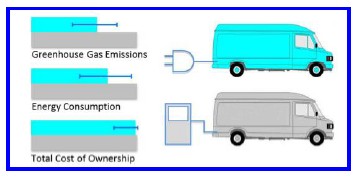We compare electric and diesel urban delivery trucks in terms of life-cycle energy consumption, greenhouse gas (GHG) emissions, and total cost of ownership (TCO). The relative benefits of electric trucks depend heavily on vehicle efficiency associated with drive cycle, diesel fuel price, travel demand, electric drive battery replacement and price, electricity generation and transmission efficiency, electric truck recharging infrastructure, and purchase price. For a drive cycle with frequent stops and low average speed such as the New York City Cycle (NYCC), electric trucks emit 42 – 61% less GHGs and consume 32 – 54% less energy than diesel trucks, depending upon vehicle efficiency cases. Over an array of possible conditions, the median TCO of electric trucks is 22% less than that of diesel trucks on the NYCC. For a drive cycle with less frequent stops and high average speed such as the City-Suburban Heavy Vehicle Cycle (CSHVC), electric trucks emit 19 – 43% less GHGs, consume 5 – 34% less energy, but cost 1% more than diesel counterparts. Considering current and projected U.S. regional electricity generation mixes, for the baseline case, the energy use and GHG emissions ratio of electric to diesel trucks ranges from 48 to 82% and 25 to 89%, respectively.

Resources:
-
Lee, Dong-Yeon, Valerie M. Thomas, and Marilyn A. Brown. 2013. “Electric Urban Delivery Trucks: Energy Use, Greenhouse Gas Emissions, and Cost-Effectiveness,” Environmental Science and Technology, 47(14) 8022-2030.
- Fleet Owner article: Environmental, but Not Green, Savings from the Electric Truck
Researchers:
- Dr. Marilyn A. Brown: marilyn.brown@pubpolicy.gatech.edu
- Dong-Yeon Lee: dlee348@gatech.edu
- Valerie Thomas: valerie.thomas@isye.gatech.edu
